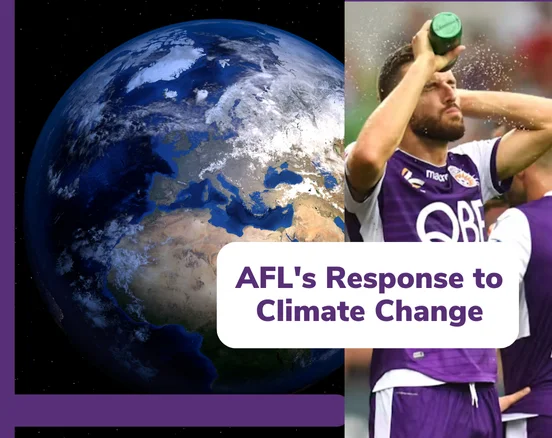AFL's Response to Climate Change
Last updated on February 10, 2025 at 14:24 pm
Posted on February 10, 2025 at 14:24 pm
You might be surprised to learn how the AFL is tackling climate change head-on, integrating sustainability into every facet of its operations. From renewable energy initiatives to innovative waste reduction strategies, the organization is setting ambitious goals for a greener future. Engaging players and communities in climate awareness plays a crucial role in this effort. However, as you consider the impact of these initiatives, you may wonder what specific changes are on the horizon and how they will shape the league's legacy.
Overview of AFL's Climate Initiatives
AFL's commitment to sustainability showcases its dedication to combating climate change. You'll see how this organization actively works to reduce its carbon footprint through various innovative initiatives. By investing in renewable energy sources, AFL aims to power its operations sustainably, minimizing reliance on fossil fuels.
You might be interested to know that AFL's waste reduction strategies focus on recycling and composting, ensuring that a significant portion of waste generated at events is diverted from landfills. By implementing these practices, AFL not only lowers its environmental impact but also sets an example for fans and other organizations.
Incorporating green technology into its operations is another key aspect of AFL's climate initiatives. From energy-efficient lighting to smart water management systems, these advancements help AFL optimize resource use and reduce greenhouse gas emissions.
Beyond its own operations, AFL engages in climate advocacy, partnering with local communities to promote sustainable practices. By raising awareness and encouraging fans to participate in environmental initiatives, AFL fosters a culture of sustainability that extends beyond the game. You'll see that AFL's proactive approach is a promising step towards a greener future.
Sustainable Stadium Practices
Stadiums play a pivotal role in AFL's sustainability efforts, as they serve as hubs for fans and community engagement. By implementing sustainable practices, these venues not only reduce their environmental impact but also inspire fans to embrace eco-friendly habits.
Here are some key sustainable stadium practices to consider:
- Green energy: Many stadiums are transitioning to renewable energy sources, like solar and wind power, to minimize their carbon footprint.
- Waste management: Effective recycling and composting programs help divert waste from landfills, promoting a circular economy within the stadium.
- Water conservation: Implementing rainwater harvesting systems and low-flow fixtures ensures efficient water use, making a significant impact on overall consumption.
- Sustainable materials: Choosing eco-friendly materials for construction and renovations, such as recycled steel and sustainable wood, helps support responsible sourcing.
Moreover, promoting eco-friendly transportation options, like public transit and bike parking, encourages fans to arrive sustainably. By adopting these sustainable stadium practices, you contribute to a more environmentally responsible future for AFL and inspire others to follow suit.
Also Read: AFL Trade Drama Unfolds: Teams on Edge
Player and Community Engagement
Engaging players and the community is crucial for fostering a culture of sustainability within the AFL. You can lead the charge through player education, ensuring that athletes understand their role in promoting climate awareness. When players embody these principles, they inspire fans to do the same, making a significant impact on the community.
Community outreach initiatives create opportunities for fans to get involved. Organizing events focused on sustainability helps raise awareness about climate issues, while also encouraging grassroots initiatives that empower local communities. You might consider leading clean-up days or tree planting events, allowing fans to actively participate in environmental efforts.
Moreover, fan involvement is key. By utilizing social media and community programs, you can engage supporters in discussions about climate change and the AFL's commitment to sustainability. Fans can contribute by sharing their own initiatives and participating in campaigns aimed at reducing the league's carbon footprint.
Ultimately, creating a collaborative environment where players and fans work together will strengthen the AFL's role as a leader in climate action. Together, you can make a real difference, fostering a sustainable future for the sport and the planet.
Partnerships for Environmental Impact
Strategic partnerships can significantly amplify the AFL's environmental impact. By joining forces with organizations focused on sustainability, you can drive meaningful change. These collaborations enable you to tackle pressing environmental issues together, enhancing your conservation efforts and reducing the league's carbon footprint.
Here are some key benefits of these partnerships:
- Access to green technology: Collaborating with tech companies can help you implement innovative solutions.
- Joint collaborative projects: Working alongside environmental NGOs can strengthen your initiatives.
- Increased awareness: Partnerships can elevate your message, reaching broader audiences and inspiring them to take action.
- Support for renewable energy: Teaming up with energy providers can facilitate the transition to sustainable practices in venues.
Through these partnerships, you can not only enhance your environmental initiatives but also set a powerful example for fans and communities. By investing in sustainable practices and embracing renewable energy, the AFL can lead the way in making a positive impact on the planet. Together, you can create a greener future for everyone involved in the game and beyond.
Future Goals and Commitments
Building on the strong foundation laid through partnerships, the AFL is setting ambitious goals to further its commitment to sustainability. You'll see a comprehensive approach that includes carbon neutrality strategies aimed at reducing the league's overall greenhouse gas emissions. By prioritizing renewable energy adoption across all venues, the AFL is not just minimizing its carbon footprint but also leading the way for others to follow.
Additionally, the AFL is implementing waste reduction programs that focus on minimizing landfill contributions and promoting recycling. These initiatives will ensure that every game day becomes an opportunity for sustainable practices. Alongside these efforts, the league is investing in ecological restoration efforts, supporting local habitats that are crucial for biodiversity.
Conclusion
In summary, AFL's proactive approach to climate change showcases its commitment to sustainability through innovative practices and community engagement. By embracing renewable energy, reducing waste, and forming impactful partnerships, you're helping to create a greener future. As you continue to push for ambitious goals like carbon neutrality, your efforts not only benefit the environment but also inspire others to join the fight against climate change. Together, you're making a significant difference for generations to come.













